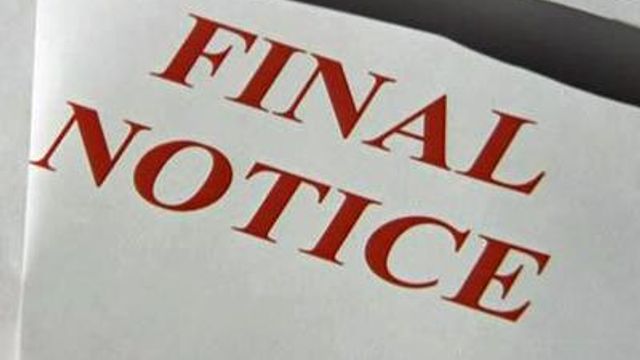Considering bankruptcy? Consider this
With today's economy and unemployment situation, many families are deep in debt with no way to pay their bills. The American Bankruptcy Institute reports that, nationwide, the number of consumer bankruptcy filings in August were up 24 percent year-to-year.
Posted — UpdatedWith today's economy and unemployment situation, many families are deep in debt with no way to pay their bills. The American Bankruptcy Institute reports that, nationwide, the number of consumer bankruptcy filings in August were up 24 percent year-to-year.
The decision to declare bankruptcy should not be a quick one. You need to first do everything you can to cut spending and repay your debt. But many people have reached the point of filing for bankruptcy.
“It's just a big change for them. People who never thought they were gonna have to think about filing bankruptcy are now in a situation where they're gonna have to evaluate it, so it's a difficult time,” said bankruptcy attorney Travis Sasser.
There is a lot to consider before taking that step.
“You typically try to avoid it if you can. It's something you do if basically you don't have any other choices,” he said. “Merely falling 30 or 60 days behind on your debt, although that's unfortunate, and it can have some really negative repercussions, I don't know that that necessarily in and of itself would trigger a bankruptcy filing.”
Imminent foreclosure, skyrocketing medical bills, lawsuits and an overwhelming amount of debt are some of the main reasons people file for either Chapter 7 or Chapter 13.
With Chapter 7, credit card balances, medical bills and most other unsecured debts are erased. But that doesn't mean you keep your home and car free and clear. There are limits.
“The debtor is going to have to either pay on that obligation or they're going to have to surrender the collateral back to the finance company,” Sasser said.
So if you have a lot of equity in your home, you could be forced to sell it.
Chapter 13 is a five-year repayment plan. It's often the choice of people who want to keep their house.
“The biggest challenge in Chapter 13 is being able to make the payments,” Sasser said.
If that becomes too difficult, Chapter 7 is still an option.
“Perhaps the debtor would like to keep their house, but then they lose their job. Well, at that point they just want to extinguish whatever remaining debt they can and they convert it to Chapter 7,” Sasser said.
Both types come with serious ramifications. A bankruptcy is on your credit report for 10 years. For awhile, it can devastate your credit scores, making it more difficult and expensive for you to get credit.
“Most of my clients are able to rebuild their credit fairly quickly. Now, for the first year or two, the type of credit that's gonna be offered is not gonna be very attractive,” Sasser said.
While some people may see bankruptcy as an easy way out, Sasser says most arrive there only after exhausting every other avenue to pay their bills.
“Most people are not seeking to incur debt beyond their means and most people who file bankruptcy really don't want to have to do it. They really are left with no choice. And certainly there are bad actors and people that are not sympathetic, but by and large, the people that I meet with, and I meet with people all the time, are just good, hard-working people,” he said.
There are many other issues to check into when you're considering bankruptcy. For example, how it impacts your personal life. Every detail of your finances must be disclosed to the court, which then becomes public record.
• Credits
Copyright 2024 by Capitol Broadcasting Company. All rights reserved. This material may not be published, broadcast, rewritten or redistributed.






